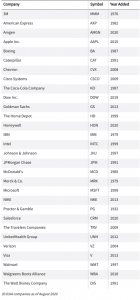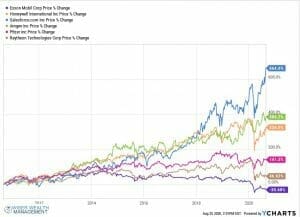
Dow Jones Shakeup
Last Monday, the Dow Jones Industrial Average (DJIA), or the Dow, announced its biggest shakeup in years. Oil mogul ExxonMobil, pharmaceutical company Pfizer and defense contractor Raytheon would be replaced with cloud software company Salesforce, biopharmaceutical company Amgen and manufacturing company Honeywell.
The Dow is a stock market index tracking the 30 largest companies on the New York Stock Exchange (NYSE) and the NASDAQ. Unlike the S&P 500, which is a market cap weighted index, the Dow is a price weighted index. It was created in 1896 by Charles Dow and originally consisted of only twelve companies primarily in the industrial sector. While it has long been correlated to the strength of the economy, it is composed of only select blue-chip names and is not directly representative of the broader overall market.
Some notable changes to the index include the 1997 shakeup when Travelers Group replaced Westinghouse Electric, Johnson & Johnson replaced Bethlehem Steel, Hewlett-Packard took over Texaco’s spot and Wal-Mart overtook Woolworths. Shortly after, in 1999, Chevron, Sears Roebuck, Union Carbide, and Goodyear Tire were dropped and replaced with The Home Depot, Microsoft, Intel and SBC Communications. In 2013, Visa, Goldman Sachs and Nike replaced Bank of America Corp, Hewlett- Packard and Alcoa. In 2018, Walgreens replaced General Electric which was the last remaining original member of the index.
Then on August 24, 2020, the Dow announced oil mogul ExxonMobil, pharmaceutical company Pfizer and defense contractor Raytheon would be replaced with cloud software company Salesforce, biopharmaceutical company Amgen and manufacturing company Honeywell. These changes will take effect on August 31st.
The new index is listed below.
The recent changes are due to the fact that Apple announced a 4:1 stock split that moved their share price from $500 to $120. This three-quarter reduction in price caused Apple’s new weight in the index to drop by 75%. However, Apple still makes up 28% of the Dow gains in the month of August.
The removal of companies like Exxon could be historic because it shows a shift in the economy and the movement of the Dow to reflect more of the overall market. In the early 2000s, Exxon was the most valuable company on the index. Then in the last decade, along came the new tech companies with Apple surpassing Exxon and becoming a $2 trillion-dollar company at the end of August. Exxon’s market value has plummeted down to $175 billion. This could show a significant changing of the guard from oil, gas and fossil fuel companies to tech and the environmental, social and corporate governance (ESG) environment. In the 80s, energy made up a quarter of the Dow. Itt is just over 2% and Chevron is the only energy stock remaining, for now. According to analysts, Chevron remains because it is more of an oil producer, has more free cash flow and a stronger balance sheet.
On the S&P 500, the energy sector now makes up only 2.5% compared with 6.84% five years ago and 10.89% ten years ago. Technology has jumped from 18.48% of the index in 2010 to 28.17% today. As recently as 2013, Exxon ruled the S&P 500 and the market in general as the largest publicly traded U.S. company. However, Microsoft MSFT, Amazon AMZN, Apple AAPL, Google GOOGL and Facebook FB are now larger than the entire energy sector.
While the subbing of companies in the index may show a changing of the guard, it does not necessarily mean the end for the energy sector or individual companies’ success. Wharton University professor and economist Jeremy Siegel did a study that measured the impact of all additions and deletions to the S&P 500 since its creation in the 1950s. He found that the deletions, on average, outperformed the additions.
It is important to remember that the price of the largest 30 stocks does not necessarily represent the overall economy. In 1939, IBM was removed from the index and then it was re-added in 1979. During this time, it outperformed the market. While this is promising for Exxon, Pfizer and Raytheon, it is not always the case. One could look to GE as an example. Companies will fade in and out of prominence due to management, the overall economic environment and new trends. This is why it is important to remember to diversify. At Wiser Wealth Management, we believe in a portfolio investing in low index ETFs focused on long-term healthy assets classes.
Matthews Barnett, CFP®, ChFC®, CLU® Financial Planning Specialist
Share This Story, Choose Your Platform!
Wiser Wealth Management, Inc (“Wiser Wealth”) is a registered investment adviser with the U.S. Securities and Exchange Commission (SEC). As a registered investment adviser, Wiser Wealth and its employees are subject to various rules, filings, and requirements. You can visit the SEC’s website here to obtain further information on our firm or investment adviser’s registration.
Wiser Wealth’s website provides general information regarding our business along with access to additional investment related information, various financial calculators, and external / third party links. Material presented on this website is believed to be from reliable sources and is meant for informational purposes only. Wiser Wealth does not endorse or accept responsibility for the content of any third-party website and is not affiliated with any third-party website or social media page. Wiser Wealth does not expressly or implicitly adopt or endorse any of the expressions, opinions or content posted by third party websites or on social media pages. While Wiser Wealth uses reasonable efforts to obtain information from sources it believes to be reliable, we make no representation that the information or opinions contained in our publications are accurate, reliable, or complete.
To the extent that you utilize any financial calculators or links in our website, you acknowledge and understand that the information provided to you should not be construed as personal investment advice from Wiser Wealth or any of its investment professionals. Advice provided by Wiser Wealth is given only within the context of our contractual agreement with the client. Wiser Wealth does not offer legal, accounting or tax advice. Consult your own attorney, accountant, and other professionals for these services.







